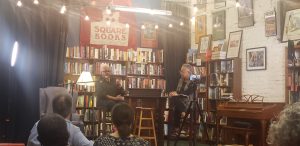
Margaret A. Burnham discussed her new book, “By Hands Now Known: Jim Crow’s Legal Executioners,” which details injustices towards African Americans in the South, on Wednesday, Oct. 12, at Off Square Books.
Burnham, who serves as both a lawyer and professor at the Northeastern University School of Law, founded the Civil Rights and Restorative Justice Project. The project revisits cold cases in an attempt to uncover new truths about racially motivated crimes, both committed and swept under the rug by those in power.
Burnham spent most of her formative years in New York despite being born in Birmingham, Ala. While her distrust with Southern government runs deep, she does not hold that against the people who inhabit Southern states, nor does she deny her parents’ experiences in Birmingham.
“The South is the landscape on which they painted their own lives,” Burnham said.
In fact, the relationship between violence and union organizing within Birmingham plays a large role in “By Hands Now Known.”
Burnham puts her skills as a lawyer to excellent use by teaching her students to reverse-engineer files in order to find cases that fall into the category of systematic racism.
While the book mainly focuses on the period of segregation from the 1920s to the 1960s, Burnham has a lot to say about the injustices of modern day, including a powerful epilogue comparing the death of George Floyd in 2020 to pre-integration lynchings.
Seven African American men were attacked and murdered in Lafayette County between the 1880s and 1930s. In 1935, Elwood Higginbotham was attacked and murdered by a white mob in broad daylight in the city of Oxford. Burnham goes into great detail about Higginbotham’s case due to its scope and relevance.
According to Burnham, even means of protest were met with racism and unequal treatment during the segregation period. With very few places for African Americans to protest the “casual brutality” their people were constantly forced to face, they would often use funerals and other similar events as a platform.
“Funerals became places of resistance,” Burnham said. “We all owe our own resistance and practice of democracy to those before us.”
Despite the simplicity of its messages, Burnham understands the complexities of such a broad and powerful project.
“The book is about the broader community responsible for injustices,” Burnham said. “It’s a national project, but also a neighbor to neighbor project.”Visit the Square Books website for more information on the book in addition to the Civil Rights and Restorative Justice Project website.


























